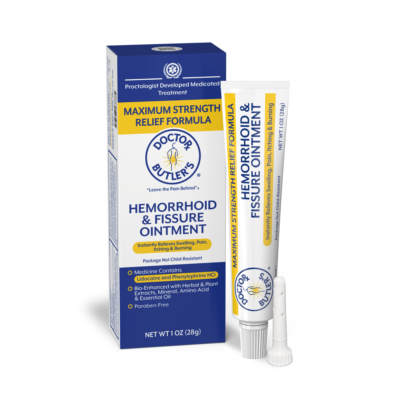Think you have a hemorrhoid? If you’re asking the question, you probably do… (though we urge you to schedule doctor’s visit to make sure it’s not a more serious condition.) That said, not all hemorrhoids are the same, and some cases are worse than others. Prolapsed hemorrhoids are among the worst as they’re typically the most painful and hardest to treat. But don’t feel hopeless if you’re worried you have one. We’ve written this guide to explain the symptoms and treatments for prolapsed hemorrhoids.
Use this guide to learn about:
- different types of hemorrhoids.
- what are prolapsed hemorrhoids?
- what to do if you think you’re dealing with a prolapsed hemorrhoid.
Who are we? We’re Doctor Butler’s, experts in down-there care of hemorrhoids and related conditions. We make proctologist-developed hemorrhoid ointments and complementary products to help you quickly leave the pain behind. Dr. Robert Cutler medically reviews all of the information here.
Pain ease
No burning . . stays put good solid product for easing pain of private area.
Verified ReviewerWhat is a Prolapsed Hemorrhoid?
Hemorrhoids can be found both internally and externally. External hemorrhoids are behind the symptoms most commonly associated with hemorrhoids, including pain, irritation and swelling. Follow the links to take a deeper dive into hemorrhoids and internal vs. external hemorrhoids.
While internal hemorrhoids develop inside the rectum, they can push downard and burst out through the anus, forming what’s known as a prolapsed hemorrhoid. Internal hemorrhoids are classified into four different grades, with the fourth grade posing the greatest potential for pain and more immediate need for medical attention. Find each grade listed below:
- Grade 1: No prolapse.
- Grade 2: A hemorrhoid that prolapses beyond anus, but will spontaneously reduce or retreat on its own.
- Grade 3: A hemorrhoid that prolapses beyond anus and can only be pushed back manually.
- Grade 4: A hemorrhoid that has prolapsed and cannot be pushed back in.
Prolapsed Hemorrhoid Causes
Added pressure on internal hemorrhoids is what can cause a prolapse. That extra strain can be due to a number of different factors, such as:
- Pregnancy.
- Obesity and weight complications.
- Cigarette smoking.
- Chronic constipation or diarrhea.
Additional disorders and treatments that can lead to hemorrhoids can be found here.
Prolapsed Hemorrhoid Symptoms
Prolapsed hemorrhoids share some overlap with symptoms we typically associate with external hemorrhoids – a small lump or lumps, insignificant bleeding, and itching, pain or irritation. Prolapsed hemorrhoids also produce some symptoms specific to the condition, however, including:
- Mucus discharge with a foul smelling odor.
- The sensation of incomplete bowel movements even after passing a stool.
- Fecal leakage.
And in most cases, they are painful. How bad do prolapsed hemorrhoids hurt? Unfortunately, prolapsed hemorrhoids have the potential to be quite a bit more painful than their external or non-prolapsed counterparts. They can become extremely swollen, blocking the passage of bowel movements, or even become thrombosed, a condition where a blood clot forms inside the hemorrhoidal vein.
Prolapsed Hemorrhoid Treatments
If you’ve self-diagnosed or confirmed with a physician that you’re dealing with a prolapsed hemorrhoid, do not delay in beginning at-home treatments and medications. Plenty of simple self-care techniques can shrink the prolapsed hemorrhoid, including:
- Sitz baths.
- Better bathroom habits.
- Icing the area.
- Gentle exercise.
- High-fiber diet.
As far as medications to consider, ointments and creams used to target hemorrhoids or anal fissures will have a similar soothing effect on a prolapsed hemorrhoid. Ingredients such as hydrocortisone and phenylephrine can help reduce the size of the hemorrhoidal vein and lidocaine can relieve pain while it subsides.
Doctor Butler’s offers a number of products containing these ingredients and more, which you can find here.
If the prolapsed hemorrhoid fails to shrink or continues to reappear, your doctor may recommend a specialized treatment option. This may include:
- Rubber band ligation.
- Sclerotherapy.
- Infrared coagulation.
- Surgery (Hemorrhoidectomy, Stapled hemorrhoidectomy, Hemorrhoidal artery ligation or Recto-anal repair).
When to See a Doctor About a Prolapsed Hemorrhoid
It is important to go see your physician for prolapsed hemorrhoid treatment when you’ve exhausted at-home solutions without signs of improvement, or when your presenting symptoms are severe, particularly any signs of heavy bleeding. Your doctor will assess the severity of the prolapsed hemorrhoid before deciding on a specialized treatment option. Less invasive procedures are considered first, with surgery reserved for the most serious hemorrhoid cases.
Ease the Pain With Doctor Butler’s Help
As we have learned, when you’re hit with a prolapsed hemorrhoid, the first step is assessment. Once you’ve identified a lump as a prolapsed hemorrhoid and not a case of external hemorrhoids, you can begin to treat the area with self-care techniques and Doctor Butler’s creams and ointments.
Should the prolapsed hemorrhoid begin to block bowel movements, fail to shrink or retreat, or consistently return, it’s time to seek medical attention. The thought of anything protruding from inside us can be scary, but Doctor Butler’s is committed to guiding you through the ins and outs of a healthy bottom.

